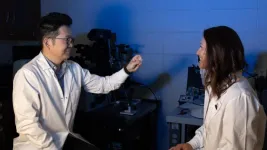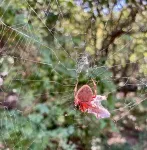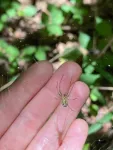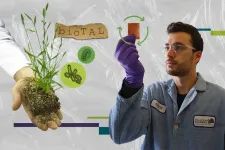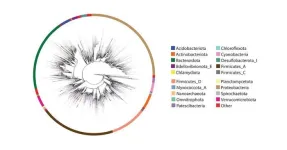(Press-News.org) In a new study funded by a $3 million grant from the National Institutes of Health (NIH), University of Missouri researcher Kiho Lee, an associate professor in the College of Agriculture, Food and Natural Resources, will use gene editing to investigate the building blocks of disease. His ultimate goal — to discover clinically significant explanations for human diseases like Alzheimer’s, cancer and infertility, while working on solutions to global food insecurity.
Common diseases, such as Alzheimer’s, are widespread in humans, plaguing an estimated 11% or 6.7 million Americans over age 65, according to The Alzheimer’s Association. Some Alzheimer’s diseases, specifically early onset cases, are highly linked to a person’s genetic background, of which gene editing could be a future solution. This dual-purpose grant will encourage scientific innovation not only in the biomedical realm, which would focus on human disease, but also in agriculture, where Lee is hopeful this research will improve pig welfare as well as increase food production for farmers.
Working toward this outcome, Lee and his team will evaluate the efficacy and safety of genome editing technology — known as the CRISPR/Cas system — to improve the gene-testing process and design approaches that help researchers make the most of a targeted genome editing event. The study objective involves investigating three specific aims:
Develop a method for the global detection of unintended outcomes from gene editing in genetically engineered pigs.
Design a method for ensuring the integrity of the genome when gene editing.
Establish a strategy for rapidly phenotyping genetically engineered pigs in utero and modifying the genome of wild-type adult pigs to ensure favorable traits for agriculture and biomedicine.
“Ultimately, the goal is to generate founder pigs that have fewer unintended modifications, which we call ‘off-targeting events,’” Lee said. “This way, the founder animals — those with modified genomes — would present the phenotype or trait that we intend to generate, making the whole process more effective.”
This study will help scientists refine the mechanism of gene editing to streamline what traits the animals will exhibit. Because breeding genetically engineered pigs often takes a significant time commitment, this is an important component to this study.
“Obviously, this research has both biomedical and agricultural implications,” Lee said. “As such, one of the phenotypes we are interested in is growth because we want our pigs to grow bigger in a shorter period of time, which would help maintain food sustainability worldwide. Making these models helps patients who are suffering from these diseases. And, although my passion is directed more toward biomedical research, when I sit down and think about it, the agricultural component has a deep impact. For example, population growth and the amount of food we need to secure in the face of climate change means we need these technologies to ensure we can respond to uncertainties and still feed everybody. Hopefully, my work will have an impact on both.”
A USDA-ARS scientist, Bethany Redel, will bring her expertise to this research, which highlights not only the existing collaboration between the University of Missouri and USDA-ARS but also an ongoing commitment to finding solutions that support the future of agriculture. This funding was awarded as part of the Dual Purpose with Dual Benefit program, which is a collaboration between the NIH and the USDA.
Editor’s note: This study’s principal investigator is Kiho Lee. Co-investigators include Bethany Redel, John Driver, Sehwon Koh, Randall Prather, Kevin Wells, Bhanu Telugu and Wes Warren.
END
$3 million grant awarded to MU researcher for leading biomedical and agricultural innovation
A dual-benefit grant awarded by the National Institutes of Health will support scientific exploration to refine gene-editing processes that are poised to inform biomedical and agricultural innovation
2023-07-27
ELSE PRESS RELEASES FROM THIS DATE:
New study reveals that tree species diversity increases spider density
2023-07-27
Spiders are often maligned for being creepy critters, but they are some of the most environmentally friendly pest regulators. Because they actively feed on flies, moths, mosquitoes and roaches, spiders eliminate parasites and many other vectors of disease—protecting both humans and plants from harm.
A new University of Maryland-led study published online in the journal Ecology found one simple way to take advantage of this natural ecosystem service: give tree-dwelling spiders a more diverse habitat.
“We found that there’s ...
IU researchers diagnose Indianapolis Zoo orangutan with rare genetic disease
2023-07-27
NDIANAPOLIS—Researchers from Indiana University School of Medicine have diagnosed a Sumatran Orangutan at the Indianapolis Zoo with a rare genetic disease called Alkaptonuria. This is the first time the disease has been confirmed molecularly in a primate other than a human.
The six-year-old orangutan, named Mila, was born at the Indianapolis Zoo in 2016. Mila had a history of dark urine that turned brown upon standing since birth, but has never shown other symptoms. Researchers from the IU School of Medicine Department of Medical ...
New $3 million grant supports research on leading cause of maternal mortality worldwide
2023-07-27
University of Missouri researchers are striving to find solutions to the leading cause of maternal mortality in the world — preeclampsia. For Laura Schulz, an associate professor of obstetrics, gynecology and women’s health in the University of Missouri School of Medicine, understanding the root causes of preeclampsia and other complicated, life-threatening maternal conditions is pivotal in advancing women’s health care.
Supported by a renewed $3 million grant from the National Institute of Child Health and Human Development (NICHD), Schulz and her team will use ...
Making renewable, infinitely recyclable plastics using bacteria
2023-07-27
Plastic waste is a problem. Most plastics can’t be recycled, and many use finite, polluting petrochemicals as the basic ingredients. But that’s changing. In a study published today in Nature Sustainability, researchers successfully engineered microbes to make biological alternatives for the starting ingredients in an infinitely recyclable plastic known as poly(diketoenamine), or PDK.
The finding comes from collaboration among experts at three facilities at the Department of Energy’s Lawrence Berkeley National Laboratory (Berkeley Lab): the Molecular Foundry, the Joint BioEnergy Institute ...
Short bursts of daily activity linked to reduced cancer risk
2023-07-27
Promising new research suggests a total of just 4.5 minutes of vigorous activity that makes you huff and puff during daily tasks could reduce the risk of some cancers by up to 32 percent.
Published in JAMA Oncology and led by the University of Sydney, Australia, the study used data from wearable devices to track the daily activity of over 22,000 ‘non-exercisers’. Researchers then followed the group’s clinical health records for close to seven years to monitor for cancer.
As few as four to five minutes of vigorous intermittent lifestyle physical activity or ‘VILPA’ was associated with a substantially lower cancer risk compared to those who undertook no ...
Johns Hopkins Applied Physics Laboratory restores cold sensation in amputees’ phantom limbs
2023-07-27
Johns Hopkins Applied Physics Laboratory (APL) researchers have developed one of the world’s smallest, most intense and fastest refrigeration devices, the wearable thin-film thermoelectric cooler (TFTEC), and teamed with neuroscientists to help amputees perceive a sense of temperature with their phantom limbs. This advancement, one of the first of its kind, enables a useful new capability for a variety of applications, including improved prostheses, haptics for new modalities in augmented reality (AR) and thermally-modulated therapeutics for applications such as pain management. The technology also has a variety ...
New resource harmonizes 16S and shotgun sequencing data for microbiome research
2023-07-27
Two leading sequencing techniques are no longer at odds, thanks to an international effort led by scientists at University of California San Diego. In a study published July 27, 2023 in Nature Biotechnology, the researchers debuted a new reference database called Greengenes2, which makes it possible to compare and combine microbiome data derived from either 16S ribosomal RNA gene amplicon (16S) or shotgun metagenomics sequencing techniques.
“This is a significant moment in microbiome research, as we’ve effectively rescued over a decade’s worth of 16S data that might have otherwise become obsolete in the modern world ...
Preventing weight gain: Yo-yo no-go zones for Australians
2023-07-27
There’s no doubt that Aussies love a good celebration. We’re all in when it comes to the weekend, and most of us can’t go past a Christmas celebration without a little bit of overindulging. But all this comes at a cost, and it’s taking a massive toll on our waistline.
Now, a world-first study from the University of South Australia exposes the real weight gains of everyday Australians, in a move to tackle overweight and obesity.
Funded by the NHMRC, and published in JAMA Open Network today, the study explored how weight changes across a 12-month period, finding that weight fluctuated throughout the year.
Specifically, ...
Closing cancer cell’s escape route
2023-07-27
Chemotherapy and radiotherapy aim to destroy cancer cells by inducing DNA double-strand breaks – damage that, once inflicted, usually causes the cells to die. But damage to a cell’s genetic material also activates a signaling pathway called IKK/NF-κB that helps prevent cell death, thus limiting the success of these treatments in patients.
NF-κB is a family of gene regulators that controls a wide variety of cellular processes – from immune responses to embryonic development – and is activated by the enzyme complex ...
Fiber-infused ink enables 3D-printed heart muscle to beat
2023-07-27
Over the last decade, advances in 3D printing have unlocked new possibilities for bioengineers to build heart tissues and structures. Their goals include creating better in vitro platforms for discovering new therapeutics for heart disease, the leading cause of death in the United States, responsible for about one in every five deaths nationally, and using 3D-printed cardiac tissues to evaluate which treatments might work best in individual patients. A more distant aim is to fabricate implantable tissues that can heal or replace faulty or diseased structures inside a patient’s heart.
In a paper published in Nature Materials, researchers ...
LAST 30 PRESS RELEASES:
Scientists reveal our best- and worst-case scenarios for a warming Antarctica
Cleaner fish show intelligence typical of mammals
AABNet and partners launch landmark guide on the conservation of African livestock genetic resources and sustainable breeding strategies
Produce hydrogen and oxygen simultaneously from a single atom! Achieve carbon neutrality with an 'All-in-one' single-atom water electrolysis catalyst
Sleep loss linked to higher atrial fibrillation risk in working-age adults
Visible light-driven deracemization of α-aryl ketones synergistically catalyzed by thiophenols and chiral phosphoric acid
Most AI bots lack basic safety disclosures, study finds
How competitive gaming on discord fosters social connections
CU Anschutz School of Medicine receives best ranking in NIH funding in 20 years
Mayo Clinic opens patient information office in Cayman Islands
Phonon lasers unlock ultrabroadband acoustic frequency combs
Babies with an increased likelihood of autism may struggle to settle into deep, restorative sleep, according to a new study from the University of East Anglia.
National Reactor Innovation Center opens Molten Salt Thermophysical Examination Capability at INL
International Progressive MS Alliance awards €6.9 million to three studies researching therapies to address common symptoms of progressive MS
Can your soil’s color predict its health?
Biochar nanomaterials could transform medicine, energy, and climate solutions
Turning waste into power: scientists convert discarded phone batteries and industrial lignin into high-performance sodium battery materials
PhD student maps mysterious upper atmosphere of Uranus for the first time
Idaho National Laboratory to accelerate nuclear energy deployment with NVIDIA AI through the Genesis Mission
Blood test could help guide treatment decisions in germ cell tumors
New ‘scimitar-crested’ Spinosaurus species discovered in the central Sahara
“Cyborg” pancreatic organoids can monitor the maturation of islet cells
Technique to extract concepts from AI models can help steer and monitor model outputs
Study clarifies the cancer genome in domestic cats
Crested Spinosaurus fossil was aquatic, but lived 1,000 kilometers from the Tethys Sea
MULTI-evolve: Rapid evolution of complex multi-mutant proteins
A new method to steer AI output uncovers vulnerabilities and potential improvements
Why some objects in space look like snowmen
Flickering glacial climate may have shaped early human evolution
First AHA/ACC acute pulmonary embolism guideline: prompt diagnosis and treatment are key
[Press-News.org] $3 million grant awarded to MU researcher for leading biomedical and agricultural innovationA dual-benefit grant awarded by the National Institutes of Health will support scientific exploration to refine gene-editing processes that are poised to inform biomedical and agricultural innovation
